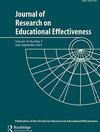两代教育项目中低收入幼儿父母的三年成果
IF 1.6
4区 教育学
Q2 EDUCATION & EDUCATIONAL RESEARCH
Journal of Research on Educational Effectiveness
Pub Date : 2023-11-09
DOI:10.1080/19345747.2023.2273511
引用次数: 0
摘要
摘要为了在劳动力市场上竞争,满足家庭的基本需求,越来越多的父母需要高等教育证书。本研究采用准实验设计来检验CareerAdvance的效果。CareerAdvance是一个两代教育干预项目,为父母提供医疗保健方面的高等职业培训,同时为孩子提供学前教育。总体而言,我们发现,CareerAdvance在项目开始后的前三年促进了低收入父母的教育进步,但对职业发展和心理健康有益的证据较弱,没有证据表明有经济收益。这个两代人的项目促进了没有高等教育证书的父母的教育和职业发展,而不是那些有高等教育证书的父母。相比之下,探索性分析表明,参加该计划的父母具有高等教育证书,在三年内,他们在经济和心理健康方面的一些个人指标上受益。关键词:父母、教育政策、倾向性评分披露声明作者未报告潜在利益冲突。这篇文章获得了开放材料的开放科学中心徽章。这些材料可在https://doi.org/10.17605/OSF.IO/5NVM3.Additional上公开获取:美国卫生与公众服务部儿童与家庭管理局资助健康职业机会基金90FX00100。卫生专业机会补助金-大学伙伴关系90PH0020,儿童和家庭管理局,美国卫生和人类服务部。凯洛格基金会资助项目P3020014。西北儿童发展基金会资助-2014年6月。本文章由计算机程序翻译,如有差异,请以英文原文为准。
Three-Year Outcomes for Low-Income Parents of Young Children in a Two-Generation Education Program
AbstractIncreasingly, parents of young children need postsecondary credentials to compete in the labor market and meet basic family needs. This study uses a quasi-experimental design to examine the effects of CareerAdvance, a two-generation education intervention that offers postsecondary career training in healthcare for parents paired with Head Start for children. Overall, we find that CareerAdvance promotes low-income parents’ educational advancement during the first three years after program entry, with weaker evidence of benefits to career progress and psychological wellbeing, and no evidence of economic gains. The two-generation program promotes greater educational and career advancement among parents without postsecondary credentials at baseline, than for parents who began the program with postsecondary credentials. In contrast, exploratory analyses suggest that parents entering the program with postsecondary credentials experienced benefits to some individual markers of economic and psychological wellbeing within three years.Keywords: ParentsHead Starteducationpolicypropensity score Disclosure StatementNo potential conflict of interest was reported by the author(s).Open ScholarshipThis article has earned the Center for Open Science badge for Open Materials. The materials are openly accessible at https://doi.org/10.17605/OSF.IO/5NVM3.Additional informationFundingHealth Profession Opportunity Grant 90FX00100, Administration for Children and Families, U.S. Department of Health and Human Services. Health Profession Opportunity Grant-University Partnership 90PH0020, Administration for Children and Families, U.S. Department of Health and Human Services. W.K. Kellogg Foundation Grant P3020014. Foundation for Child Development Grant Northwestern 06-2014.
求助全文
通过发布文献求助,成功后即可免费获取论文全文。
去求助
来源期刊

Journal of Research on Educational Effectiveness
EDUCATION & EDUCATIONAL RESEARCH-
CiteScore
4.00
自引率
11.10%
发文量
37
期刊介绍:
As the flagship publication for the Society for Research on Educational Effectiveness, the Journal of Research on Educational Effectiveness (JREE) publishes original articles from the multidisciplinary community of researchers who are committed to applying principles of scientific inquiry to the study of educational problems. Articles published in JREE should advance our knowledge of factors important for educational success and/or improve our ability to conduct further disciplined studies of pressing educational problems. JREE welcomes manuscripts that fit into one of the following categories: (1) intervention, evaluation, and policy studies; (2) theory, contexts, and mechanisms; and (3) methodological studies. The first category includes studies that focus on process and implementation and seek to demonstrate causal claims in educational research. The second category includes meta-analyses and syntheses, descriptive studies that illuminate educational conditions and contexts, and studies that rigorously investigate education processes and mechanism. The third category includes studies that advance our understanding of theoretical and technical features of measurement and research design and describe advances in data analysis and data modeling. To establish a stronger connection between scientific evidence and educational practice, studies submitted to JREE should focus on pressing problems found in classrooms and schools. Studies that help advance our understanding and demonstrate effectiveness related to challenges in reading, mathematics education, and science education are especially welcome as are studies related to cognitive functions, social processes, organizational factors, and cultural features that mediate and/or moderate critical educational outcomes. On occasion, invited responses to JREE articles and rejoinders to those responses will be included in an issue.
 求助内容:
求助内容: 应助结果提醒方式:
应助结果提醒方式:


